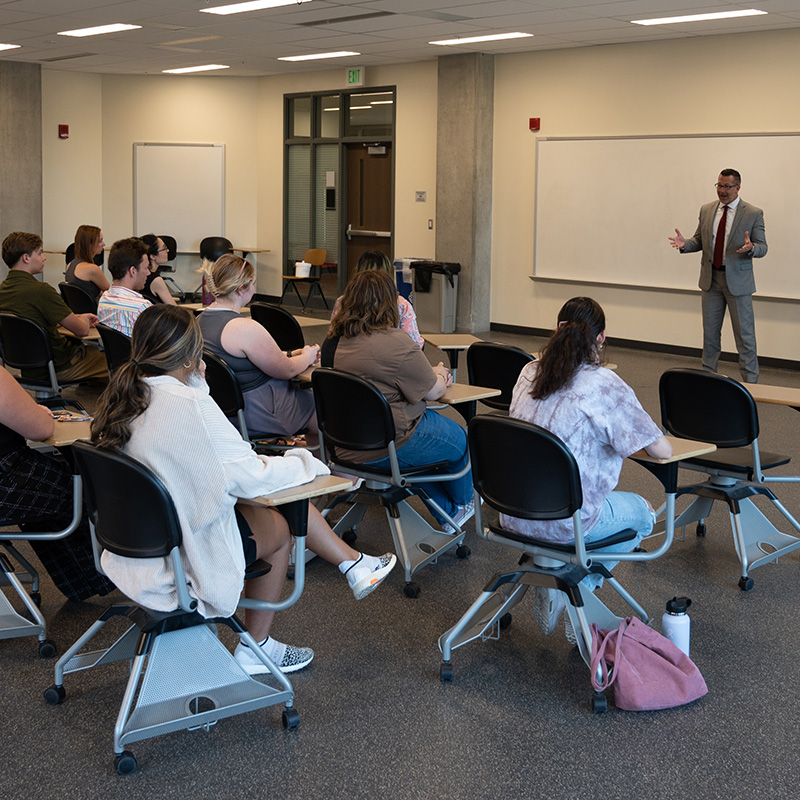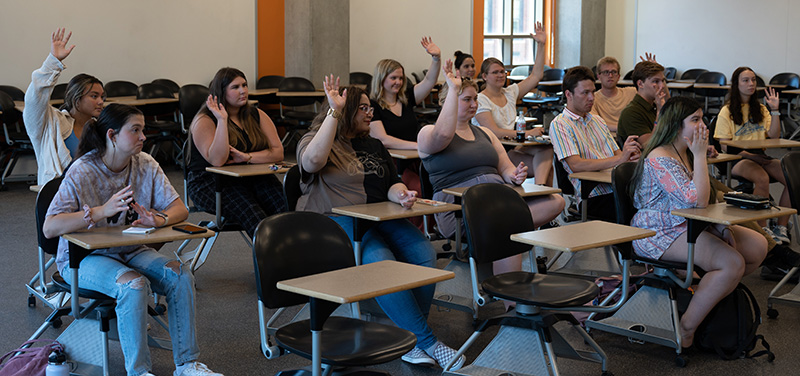Student Legal Services Creating Opportunities for Students Interested in Law

Purdue Student Legal Services is helping students interested in studying law make valuable connections and gain practical knowledge as part of a summer law practicum.
Divided into six sessions, the practicum provides opportunities for students to meet with attorneys in a classroom setting and at a law firm, visit the Tippecanoe County Courthouse to meet with judges and observe trials, meet attorneys from the university and schedule a one-on-one meeting with a judge or attorney who works in an area of law in which the student has interest. The practicum is open to any Purdue student interested in law.
Leslie Charters, director of Student Legal Services and the sponsor of the practicum, says these settings provide opportunities that students don’t necessarily receive in a classroom or even in law school. Charters draws on relationships she established during her time as a deputy prosecuting attorney and public defender in Tippecanoe County to organize engagement opportunities for students.
“I want students to gain the knowledge of what lawyers do rather than what you do in law school because, as many lawyers have already told them in practicum sessions, law school doesn’t teach you to be a lawyer,” Charters says. “Law school will teach you the law, how to read cases and maybe put that into practice through trial classes, but it doesn’t really teach you the other aspects of being a lawyer such as time management and how to convince a prospective client that you are the best attorney for the job and earn their business.”
Seeing lawyers and judges in practice has been beneficial for rising junior Maggie Fischer, who is double majoring in psychology and sociology with minors in critical disability studies and philosophy. Fischer is interested in criminal law but is also considering studying malpractice due to a desire to hold lawyers accountable.
“I’ve never had a class where we’ve gotten to go to the courthouse and watch a trial,” Fischer says. “When you do that, you get to see the emotion that comes with court because there’s going to emotion with lawsuits. Sometimes, lawyers will tell you they can block out the emotion but there are going to be some cases that are emotional and, when you go to the courthouse, you get to see that in real time.”

The format of the practicum allows students to connect with attorneys who specialize in different areas of law, ask questions in small group and one-on-one settings, and observe law professionals during the course of their work. Most practicum sessions last two hours, with the visit to the courthouse taking up a full day. During their visit to the courthouse, students observed trials and met with two judges.
“I loved talking to the judges because I’ve always had a moral conflict with criminal law and defense because I wonder how I could morally defend a criminal,” Fischer says. “The way the judges framed it was that an attorney is holding the state accountable. That aspect of what we did at the courthouse was really beneficial. It makes it more real when you’re sitting in that courtroom watching these cases happen, and watching the prosecutors, defense attorneys and judges.”
Charters created the practicum to provide an easily accessible experience for Boilermakers interested in studying law and cannot find a law internship, which can be scarce. She says she was additionally inspired by the framework of Steps to Leaps, a campus-wide initiative that focuses on enhancing student character through five pillars: leadership, networks, well-being, impact and grit. Charters says she sees specific connections to the leadership and networks pillars.
“We’re creating leaders and helping students see the law in practice,” Charters says. “We help them network with lawyers and judges that practice in areas that interest them and get an idea about what lawyers and judges do on a daily basis before they go to law school. This is a kind of access I didn’t get when I was an undergrad.”
Charters designed the practicum to allow students to gain experience while also taking classes, working a job or holding an internship. Outside of attending the six sessions, held on Tuesdays, the only requirement for participating students is to complete a one-page reflection on each session. Charters actively recruits students to participate through speaking engagements with classes and student organizations, as well as on social media. All students need to do to sign up for the practicum is email Charters to indicate their interest.
Fischer, for example, learned of the practicum when Charters spoke in the GS49000: Exploration of Law School Class. By contacting Charters, Fischer also obtained a job with Student Legal Services, where she works for three hours on weekdays managing cases and paperwork, and setting appointments. This summer, Fischer is also taking four classes and has an additional internship with Legal Aid Corporation of Tippecanoe, which provides legal representation for low-income individuals and families in Tippecanoe County. She says the practicum is a perfect fit for her busy summer schedule.
“This is probably the least time-consuming option to get legal experience,” Fischer says. “This is a really great option for people who want an internship and can’t find one because legal internships are also really hard to find.”
Student Legal Services, part of the Office of the Dean of Students and under the auspices of the Office of the Vice Provost for Student Life, provides free and confidential legal services available to all Purdue students. The department holds individual meetings with approximately 400 student clients per year, helping them navigate every step of the legal process and providing referrals when necessary. At an average rate of $250 per hour for attorneys in the Greater Lafayette area, Student Legal Services has saved Purdue students approximately $1 million in legal fees since its inception in 2013.
Services offered include landlord/tenant disputes, criminal issues, power of attorney, traffic tickets, garnishment and collection matters, notary services, family law issues, name change, city or county ordinance violations and small claims. Student Legal Services is also available to give presentations about risk management and other legal topics to student organizations and classes. Student Legal Services additionally shares legal tips of the week via social media.
Students in need of legal assistance can get started by filling out an intake form on the Student Legal Services website. Students will then be contacted to schedule an appointment. Students can also connect with Student Legal Services to view tips of the week and more via Instagram, Facebook or Twitter.
 .
.